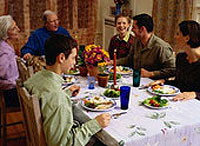
The Downside of TV Dinners
By
Amanda Gardner
HealthDay
Reporter
(HealthDay News)
-- By all means, eat dinner with your
family. Just don't watch the tube at the
same time.
That's the take-home
message of a new study that found that,
in low-income families with preschool
children, the positive effect of eating
dinner as a family tends to be negated
by watching television at the same time.
"When you have
the television on, people are essentially
eating alone," said Arlene Spark,
associate professor of nutrition at Hunter
College in New York City. "Eating
meals together and having family interactions
has been associated with better food at
meals. We would like to say turn the television
off and speak to one another, but I don't
know if that means carrots are going to
fly onto the plate. But it's a good practice
to be able to interact with children and
family."
Bonnie Taub-Dix,
a spokeswoman for the American Dietetic
Association and a nutrition consultant
in New York City, added: "You really
need to be selective about the TV and,
in this day and age, it's so rare that
families even get together to have a meal
that that needs to be precious time."
Neither Spark nor
Taub-Dix was involved with the study,
which appears in the April issue of the
Journal of the American Dietetic Association.
The findings essentially
corroborate previous research that has
found, among other things, that preschoolers
who spend more time glued to the television
have worse diets and that families dining
together tend to have better eating habits.
"Lots of studies
have found that when families eat together
and presumably talk, kids eat healthier
and do better, they're less likely to
drink and use drugs. It's pro-social behavior,"
said Dr. Barbara A. Dennison, senior author
of the study and director of the Bureau
of Health Risk Reduction, Division of
Chronic Disease Prevention and Adult Health
at the New York State Department of Health.
And when diners
are focusing on the TV set, they're not
paying attention to what they eat. "It's
not just having interactions but also
not appreciating the food that you're
eating simultaneously," Taub-Dix
said. "In terms of the childhood
obesity epidemic in this country, part
of what contributes is not just how TV
takes away from physical activity, but
it's distracting, and you don't know how
much you're eating. It's a double whammy."
For this study,
more than 1,300 parents or guardians of
children participating in New York's Special
Supplemental Nutrition Program for Women,
Infants and Children were surveyed on
how many days a week the family ate dinner
together, the number of days each week
the TV was turned on during dinner, and
how often fruits and vegetables were served.
More fruits and
vegetables were served on the nights families
ate dinner as a unit. Servings of fruits
and vegetables decreased each night the
TV was turned on during the meal. Neither
eating together nor having the television
on seemed to have any relationship with
servings of milk.
Fruits and vegetables
are important components of any healthful
diet and have been associated with decreased
cardiovascular disease and certain types
of cancer.
The study also found
that:
* Hispanic and black
parents reported having the television
on during dinner more often than white
parents.
* Hispanic and white
families tended to eat together more often
than black families.* The television was
turned on more often in families in which
the parent had less than a high school
education.
"There are
lots of reasons for families to try to
eat together," Dennison said. "I
don't think people should have TVs in
rooms that you eat in. There are things
to do to change the home environment so
it's not easy to have the TV on while
eating dinner."
More information
Visit the Center for Screen-Time Awareness
for more on TV-Turnoff
Week, which is April 23-29.
Copyright (c) 2007
ScoutNews, LLC. All rights reserved.

















